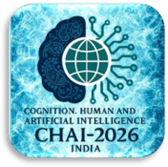
The International Conference on Cognition, Human and Artificial Intelligence (CHAI-2026) provides a platform where researchers, educators, and practitioners can create, exchange, and synthesize their ideas and discuss the most recent innovations, trends, experiences, and challenges in the field of cognition, neuroscience, psychology, machine learning, AI ethics, and human-computer interaction and intelligent technology. This conference seeks to bring together researchers, practitioners, and thought leaders to discuss the challenges and opportunities presented by AI in enhancing or altering human cognitive processes. The conference provides a multidisciplinary platform for the presentation and discussion of innovative ideas, practical applications of AI in various sectors, including healthcare, education, and industry. CHAI seeks to promote cross-domain collaboration in areas such as smart cities, green energy, healthcare, agriculture, environmental monitoring, intelligent transportation, and digital governance, with a focus on technological convergence that drives long-term societal impact. The conference aims to foster the integration of AI, IoT, data science, automation, and cyber-physical systems in designing resilient, energy-efficient, and intelligent infrastructures for a sustainable future.
Aims: -
-
To bring together researchers, academics, and professionals from cognitive science, cognitive modeling, AI, machine learning, robotics, Natural Language Processing, Neural Networks, decision-making, perception psychology, neuroscience learning and related disciplines.
-
To promote research on understanding human cognition and explores how these insights can be applied to develop more intelligent and human-like AI systems.
-
To address the ethical, psychological, and societal implications of AI technologies and ensure implementations of these technologies are more responsible and human-centered design.
-
To explore emerging technologies and applications that improve collaboration and communication between humans and AI systems.
-
To offer the forum for sharing recent research findings, methodologies, tools, and theoretical advancements.
Objectives: -
-
To engage in discussions on how AI can augment human abilities, improve quality of life, and contribute to fields such as education, Agriculture, healthcare, and mental health.
-
To include diverse perspectives from different regions and cultures to ensure inclusive and globally relevant discourse.
-
To showcase papers and presentations on topics such as cognitive modeling, natural language processing, neural networks, decision-making, perception and learning.
-
To encourage participation from early-career researchers and students by offering workshops, poster sessions, and networking opportunities.